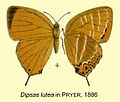Japonica lutea
| Japonica lutea | |
|---|---|

| |
| Scientific classification | |
| Kingdom: | |
| Phylum: | |
| Class: | |
| Order: | |
| Family: | |
| Genus: | |
| Species: | J. lutea
|
| Binomial name | |
| Japonica lutea | |
Japonica lutea is a small butterfly found in the East Palearctic that belongs to the lycaenids or blues family.
Description from Seitz[]
Z. lutea Hew. (74 f). The outer margin of the wings strongly rounded. particularly in the female; hind wing with a long tail. Honey-yellow, the forewing with a broad black distal border. Underside with a white submarginal line, which separates the disc from the orange-red distal margin; on the disc white- edged bands, a short similar hand on the cross-veins of the forewing. In Amurland and Japan. — Larva on Quercus mongolica, very frequently infested with the larvae of Diptera. The butterflies occur in August on wide roads in forests of high trees and also in bush-woods; they are rather plentiful in many places. The Continental specimens do not differ from Japanese ones; the black border of the forewing varies rather strongly in width among the individuals from the same locality.[2]
Biology[]
The larva on feeds on Quercus mongolica , other Quercus and Cyclobalanopsis glauca.

Seitz 74f

Japonica lutea in Rhopalocera nihonica
Subspecies[]
- Japonica lutea lutea Japan.
- Japonica lutea adusta (Riley, 1939) Sichuan, East Tibet
- Japonica lutea dubatolovi Fujioka, 1993 Amur Oblast, Ussuri.
- Japonica lutea gansuensis Murayama, 1991
- Japonica lutea patungkoanui Murayama, 1956 Taiwan.
- Japonica lutea tatsienluica (Riley, 1939) Szechuan.
See also[]
References[]
- Theclini
- Theclinae stubs

